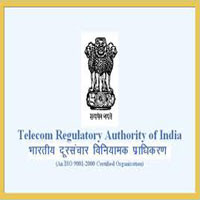  The Telecom Ministry has asked telecom regulator TRAI to review its recommendations on the timeframe for service providers to surrender excess spectrum in their possession and the rationale behind a spectrum transfer charge in case of the merger of two entities.
"Department of Telecom (DoT) has asked TRAI to review its recommendations on the timeframe for surrendering excess spectrum and the rationale behind a spectrum transfer charge during the merger of two companies," the DoT said in a communication to the Telecom Regulatory Authority of India (TRAI).
In May, TRAI had gave its recommendations on a ''Spectrum Management and Licencing Framework', in which it had said that consequent to the merger of licences in a service area, the total spectrum held by the resultant entity post-merger shall not exceed 12.4 MHz for GSM technology, or 10 MHz in case of CDMA technology.
The authority had separately recommended that excess spectrum beyond 6.2 MHz/5 MHz being held by the resultant entity, pursuant to merger/acquisition, would be liable to be charged at current market price.
Furthermore, TRAI had suggested that if, as a result of the merger, the total spectrum held by the resultant entity was beyond the prescribed limits, the excess spectrum must be surrendered.
The resultant entity from a merger or acquisition would have the discretion to choose the band to surrender spectrum beyond the ceiling level.
Consequent to the merger of licences in service areas, the resultant entity will entitled to the total amount of spectrum held by the merged entities. However, this is subject to the condition that the licencee will surrender any excess spectrum held by it, as per the allocation cap stipulated for GSM and CDMA technologies, within a period of three months.
In case of a failure to meet the spectrum allocation criterion within three months, the post-merger licencee shall surrender the excess spectrum, if any, failing which it may be treated as violation of terms and conditions of the licence agreement and appropriate action will be taken.
Furthermore, TRAI had recommended that a spectrum transfer charge, at 5 per cent of the difference between the transaction price and the total spectrum price, will be payable by the merged licencee within a period of three months after the merger is approved by the DoT.
TRAI made the recommendation on the premise that service providers were given contracted spectrum at a price less than the market rate. |